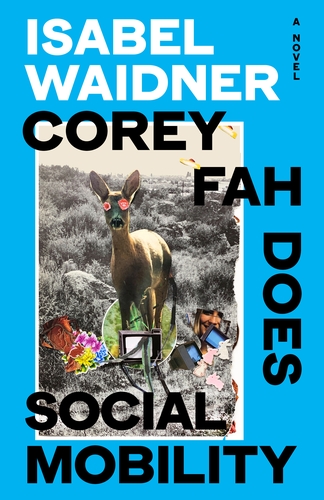ralentina reviewed Corey Fah Does Social Mobility by Isabel Waidner
A wild ride of a book
4 stars
Content warning Clearly-labelled major spoilers
Corey Fah, a queer working-class writing, unexpectedly wins a literary prize. They (and their partner) think this will be a turning point in their life but, when they try to collect the prize and 'capitalise' on it, they find out everything is stacked against it: undecipherable cultural codes, gatekeepers, UFOs, spatio-temporal wormholes, past traumas, greedy fast-food chains. Will our heroes succeed, whatever that means?
Below is a sort of point-by-point summary of the plot, which I made to keep track of what was happening, and to fulfill my official recapping duties. While it is a relatively fast-paced book, I'm still genuinely unsure about the extent to which the plot matters, and the extent to which the meaning of the book is shaped by its language and cultural references (of which there are many). I don't know if there is an expression for it, but I would call it a stylistic social commentary. In other words, I think the book is designed to make any reader feel confused, frustrated but also quite amused, the way Corey seems to feel about the prospect of social mobility. For the first few chapters, this really alienated me, to the point I was considering giving up. The more I read, the more I got into it, and now I think this is one of the most thought-provoking and surprising books I have read in a while.
!SPOILERS AHEAD! Corey wins the prize (The Award for the Fictionalisation of Social Evils) and goes to pick it up, but all they can see it's a floating UFO, and an weird creature, like Bambi with spider legs, aka Bambi Pavok. They take Bambi Pavok home. There, with their partner Drew, they watch their favourite reality TV show, St Orton Gets to the Bottom of It. In the show, St Orton investigates mysterious time-defying wormholes with the help of the audience, in this case of Malachi Hölderlin and their allegedly time-travelling rabbit Fumper. Meanwhile, we learn that Bambi Pavok comes from a forest in 1942, where he had a traumatic beginning with an abusive step father, who terrorised them by suggesting their would be used as meat by the rapidly-growing frikadelle fast food chain. Corey makes a second attempt at collecting the prize, this time sending Drew on their behalf. Drew also fails, and also comes up with a new creature: Fumper. Back home, Drew convinces Corey to go on TV to talk about their encounter with Bambi Pavok. Before the show, Corey and Drew meet St Orton and discover he had also won the same literary prize in the 1960s, but hadn't managed to 'capitalise' on it. When the show starts, things don't go as planned, because Bambi Pavok kills Fumper live on TV, causing production to suspend the show. St Orton, the presenter, disappears and the production company asks Corey to take his place. The revamped show would focus on their attempt to capitalise on their literary prize, and likely fail. At this point we learnt that, the night after their first TV appearance, Corey had tried to push Bambi Pavok back through the wormhole from which they had emerged. They had experiences the time travel together with Bambi Pavok, and witnessed a violent fight between St Orton and his lover, and likely accidentally contributed to St Orton's death. Bambi pavok travels back, taking St Orton's trophy with them in the 1942 forest. Corey and Draw persuade the TV production company to film their mission, time travelling to the forest to rescue St Orton's trophy. They find the trophy used as a tip jar in one of the frikadelle restaurants, where Bambi Pavok's step father works as a manager. They are quickly kicked out of the restaurants. Malachi Hölderlin reappears on the scene, seeking revenge for the killing of Fumper by sabotaging Corey's success. As they are threatening Corey (live on TV), a new wormhole appears and swallows the whole TV studio (which is located in an abandoned stadium). All characters find themselves stuck in a 10 minute time loop, until Corey solves the problem by arranging for Malachi Hölderlin to be given their trophy twenty years in the future.


